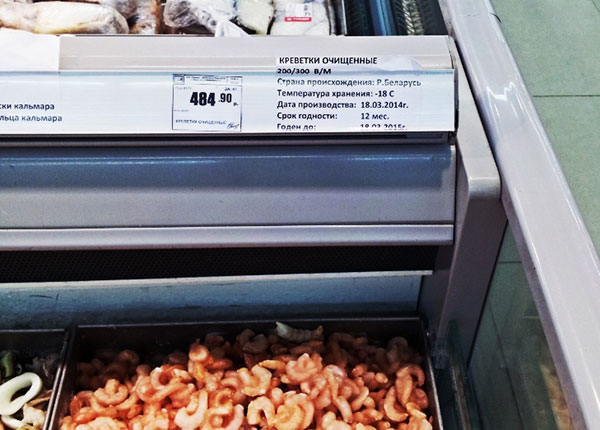Vitalyur: seafood supplies from Belarus to Russia decreased
Fish enterprises explain Belarusian shrimp on Russian shelves.
In Russian shops are now selling Belarusian ... shrimp. Judging by the photos from social networks, seafood from our country sold in Kursk store costs, if converted to Belarusian rubles, 140 thousand per kilogram.
"We can deliver sufficiently processed finished products. The ones we prepare and recycle ourselves, we cannot resell raw products," explains Santa-Bremor company which is engaged in fish and seafood processing and sells peeled prawns to Russian stores.

Belarusian shrimp in the Russian store. (Photo by diyarl з http://img.d3.ru )
The company noted that they haven't yet increased exports to Russia, but they are going to do it in the near future.
Vitalyur, which also sells fish, has seen its exports to Russia fall instead.
"It is not enough to just process goods for them to become Belarusian. There must be deep processing. We are currently busy with certification and are going to supply processed products," explains Vitalyur.
Belryba also felt no export increases to Russia. They are currently having some documents approved.
"There should be approval of the Russian veterinary service. They were supposed to issue documents, but now the process is suspended."
There has been no increase in supplies at meat processing plants. Magileu and Grodna did not feel that "meat was sold to Russia in bulk."
Meanwhile, Rosselhoznadzor found in Belarusian goods coming across the border illegal European goods. Previously, it should be recalled, Russia imposed one-year sanctions against a range of goods from the EU, the USA, Norway and other countries.
"On some roads near the border with Belarus we stopped attempts of goods delivery from Belarus with a total weight of more than 100 tons. In 9 cases, the products lacked phytosanitary certificates, including the ones from the EU. There were products from Hungary and Spain which are also banned from entering Russia. This indicates the inability of the chief inspection of seed production, quarantine and plant protection control the movement of products" described the violations press service of Rosselhoznadzor.
They added that within a few days they recorded delivery to Russia via Belarus of batches of apples, peaches, plums, tomatoes without the specified country of origin or with indication of permitted Turkey, Serbia, Macedonia, and African countries in particular Zimbabwe. During the inspection it was found that fruits and vegetables were imported from Poland, Slovenia, the Netherlands, Lithuania and some other EU countries.
Rosselhoznadzor threatened to limit supplies from Belarus, if such deliveries would continue.
Photo 1: econet.ua , photo 2: ibigdan.com
















